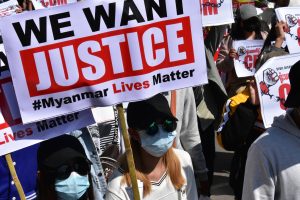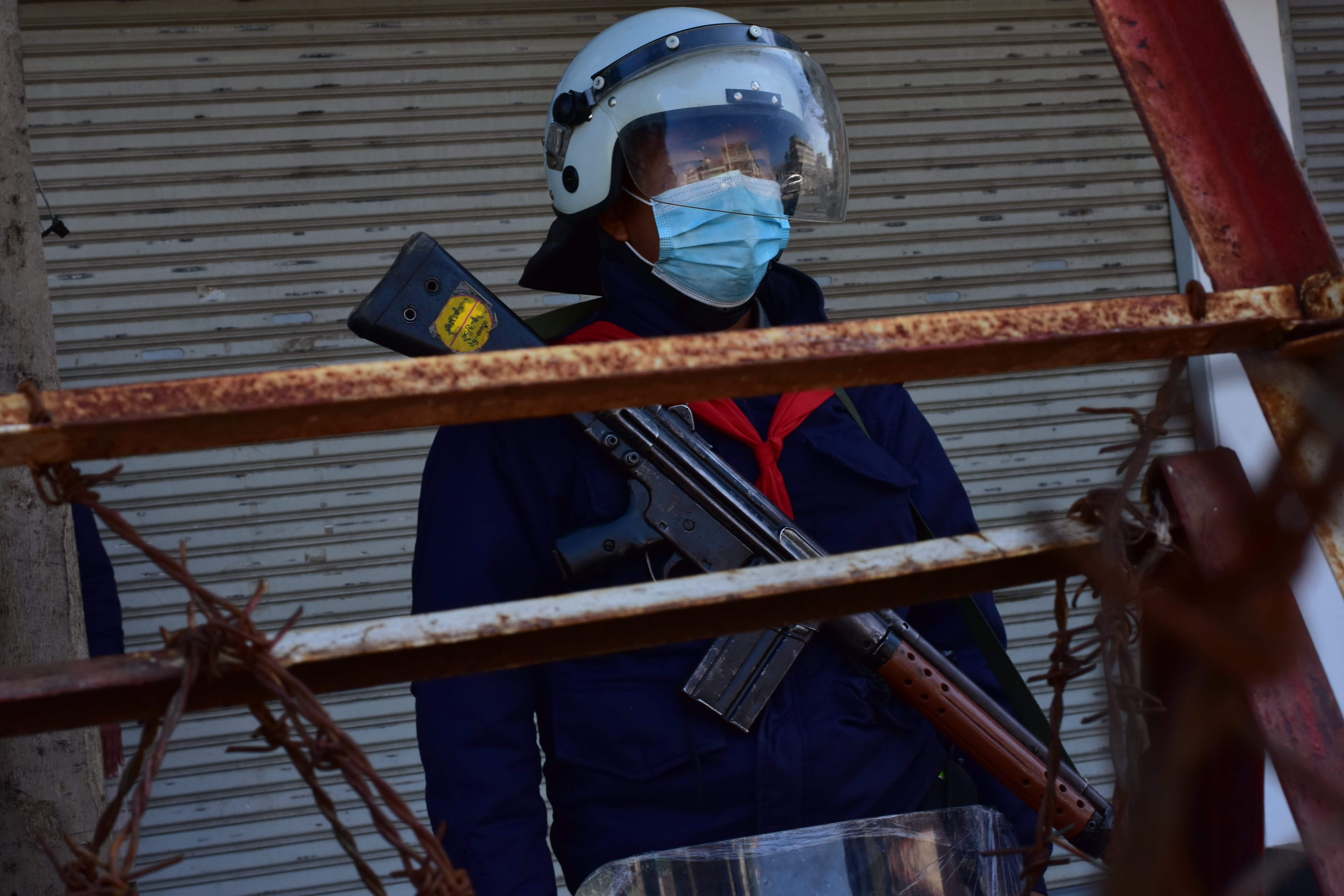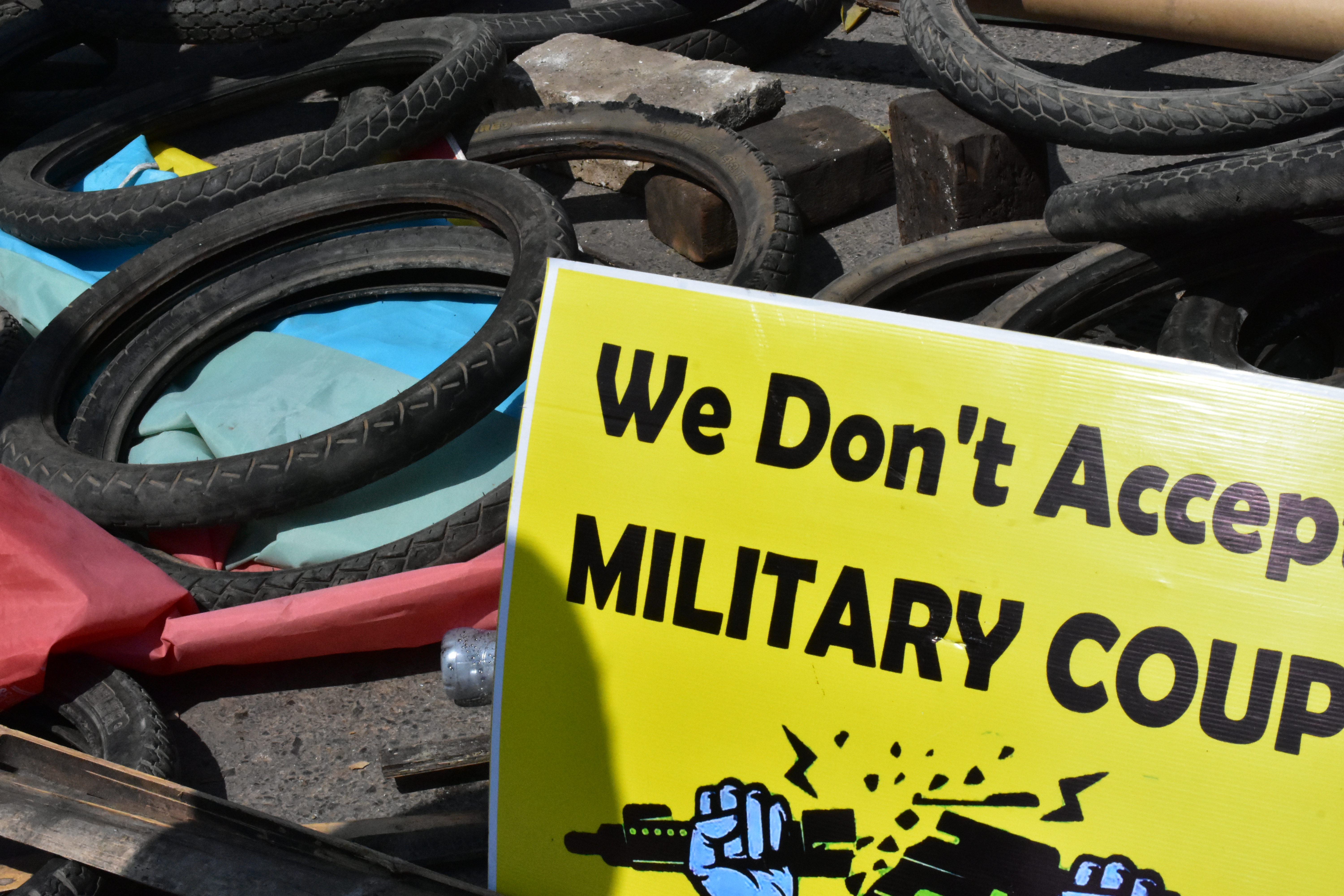In broad daylight, Daw My Zun Ko, a female lawyer providing free services for young abductees in Myanmar, was beaten and abducted in Mandalay. For Myanmar’s legal community, such arbitrary arrests are something they must reckon with on a daily basis.
“Even before the coup, we have been working to ensure that the basic legal rights of every person are respected in case of an arrest or judicial accusation. This has become even more challenging in recent times,” says Miriam Chinnappa, who heads a large-scale criminal justice program implemented by International Bridges of Justice (IBJ) in Myanmar.
Since 2013, IBJ has pioneered efforts to secure legal aid in this country, by training hundreds of lawyers, providing early legal representation, and raising rights awareness among the people. Presently, it is one of the few international organizations remaining in Myanmar, and its lawyers continue to engage with the criminal justice system to open entry points for people to access justice.
“Myanmar’s air-kiss with democracy had raised big hopes for the people of Myanmar and especially young lawyers who had immense faith in the future of rule of law and peace. They are now deeply affected by the uncertain fall into a political and legal abyss,” Chinnappa says. She adds that “we’ve provided them with support to manage stress and care for their mental health and well-being during this time of crisis.”
“I felt crushed by the coup,” says May Zin Oo*, a 33-year-old lawyer based in Mandalay. “Erasing the whole profession which I am dedicated to is very difficult for me.”
The unlawfulness unleashed by the coup has resulted in the police and military acting against ordinary vendors and pedestrians. “We used to sue them for wrongdoings, now we can’t do much when they demand bribes,” she adds.
“When a vendor was threatened by police to bail out his nephew with cash [or have his nephew face arrest], I could only advise her to go with someone who is helpful in negotiation,” May Zin Oo says. “I can’t facilitate bribery, also the presence of a lawyer could make the things worse.”
For lawyers like her, “it is really frustrating that [they] can’t be as vocal as before.”
“We really wanted the criminal justice system to function even in these circumstances, but in the very beginning many lawyers had dilemmas whether to accept politically related cases at all,” she adds.
“I was so scared that a police truck would come at night that I couldn’t sleep,” says lawyer Myint Myat. Based in a town in central Myanmar, he knew, however, that the local community relies just on him and a couple of his colleagues.
“In February, we didn’t want to be confrontational, so we kept a low profile, and carefully selected the cases,” he says. “However, back then just a few lawyers dared to do so. When we took the first cases, we were under the radar of the military.”
According to the Assistance Association for Political Prisoners, the number of people arrested, charged, or sentenced in Myanmar since the military coup of February 1 now totals 4,120, in addition to 802 who were killed by the junta.
Delivering legal representation to those arrested has become more complicated, however, with the recent amendment of the legal aid law. The amendment puts restrictions on people who are eligible for legal aid, clamps down on early access to people arrested, and curtails the powers of the legal aid boards.
In Mandalay, the military tried to get a warrant issued for lawyers who stood up to help the protesters. At first the request was rejected by judges, who argued that lawyers cannot be charged for doing their work. Unfortunately, it turned out to be only a temporary respite: the lawyers were later charged on other grounds, so they went into hiding.
“Whether I am at risk now, I never can be sure,” Myint Myat explains. “Sometimes there are stories circulating about a lawyer having an issued warrant, so to avoid being arrested, another lawyer takes his case.”
Since the coup, the military junta has removed basic protections, including the right to be free from arbitrary detentions, and created new offenses to target people criticizing the coup and encouraging others to support the Civil Disobedience Movement (CDM). It has also amended the law to prevent the free flow of information and punish those disseminating information that does not present the junta in the most favorable light.
For Khin Hlaing, a lawyer based in Lashio, a city in Shan State, focusing on juvenile cases was the best option to avoid attention from the military. Many of the protesters were minors, so she always asked for bail to return them to their parents. In the early days of the post-coup reality, the legal community was able to achieve some successes.
On February 22, the General Strike Day, the security forces dispersed crowds who had gathered to protest, arresting hundreds. “My colleagues and I managed to release over 80 protesters on the following day,” Khin Hlaing says. According to her, they were detained at the military compound, and the army officer had no idea what to do with so many people. “If his superiors came to know of this, he would have gotten serious problems,” she comments.
Since then, the arrests have led to jails and military compounds becoming indescribably overcrowded, with reports of torture and sexual assault leaking from time to time from locations across the country.
“These days, however, often when I apply for bail, regardless of my defense, and witnesses, defendants are sentenced for the same penalty as those who admit guilt at once,” Khin Hlaing says.
Many lawyers are accustomed to working in hostile environments, often fulfilling their duties in the areas where armed conflicts are commonplace. “We are used to all of the shooting, so we won’t close the office because of the army crackdown,” Khin Hlaing explains.
Being surrounded by the soldiers is not, however, a perfect environment for lawyers or judges to work in.
On one occasion in February, Daw Khin Myo, a lawyer from Mandalay, says the families of arrestees organized a protest in front of the court and encouraged the judge to join the Civil Disobedience Movement, but “when the judge heard people protesting, she got angry, and ordered the security to keep them away.”
Not many judges have joined CDM. That is often explained by either their lack of support for the protest movement as a whole, or their fear of getting arrested.
“Everything depends on the attitude of individual judges. Some obey the military directives, some help within their limits,” Daw Khin Myo says.
“In one of my cases, when the defendant was charged under 505a of the Penal Code [which penalizes those encouraging members of the civil service of the security services to join the CDM], which is a non-bailable case, the judge himself, suggested the bail, so we asked for it.”
“It was quite unprecedented,” she adds. “However, immediately after this, the prosecutor appealed and the district court ordered the defendant to come to the court very fast. He rejected our motion to postpone the hearing so that the defense could better prepare.”
In the end, the bail was revoked, so the defendant was arrested again, and the township judge who granted the bail was transferred to another court, which was seen as a form of penalty.
Also, Htein Khin, a lawyer from Mawlamyine, the capital of Mon State, agrees that the judges feel pressure from the military. He recalls the case of a university student shot in the leg with a real bullet; here the judge did not grant bail although it was standard before the coup.
Indeed, under the present military dictatorship no one can be sure of their position.
Zaw Win, a lawyer from Naypyidaw, Myanmar’s capital, describes a situation that happened in court on March 25, when military forces arrived without warning: “We all were thinking that they came to arrest us. No one was able to escape when the military trucks surrounded the site.”
To the astonishment of the gathered lawyers, however, the forces arrested one of the judges who was at that moment hearing a case.
“It turned out,” Zaw Win explains, “that three days before she had shouted at policemen over the fact that one of the defendants was unlawfully released.” The chief of the military in Naypyidaw is believed to have given the order for the defendant’s release.
“Because she spoke openly on social media against the protesters and civil disobedience movement, maybe that’s why her fellow judges did not show support for her,” Zaw Min comments.
Although legal bodies such as International Bar Association have condemned the destruction of the law and the arrests of legal professionals – pointing among others to the arrest of U Nyan Win, a head of the Union Legal Aid Board and the lawyer of Aung San Suu Kyi – nothing has prompted the military to change its stance.
Aung San Suu Kyi, Myanmar’s most famous arrestee, was allowed to meet her lawyers via video call only after two months, which many considered equal to blocking her right to defend herself. Facing several charges, she has recently requested to see her legal counsel in person, which finally was permitted. On May 24, she will go on trial at the Special Court in Naypyidaw.
If Myanmar’s former leader cannot even secure legal representation in a case being closely watched around the world, what hope do the thousands of arrested young protesters have?
* The names of interviewed lawyers have been changed to protect their identities.



































